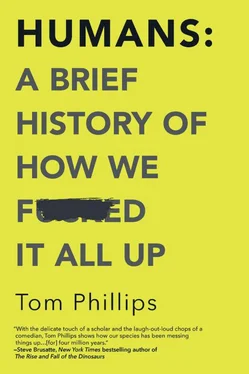Tom Phillips
HUMANS
A BRIEF HISTORY OF HOW WE F*CKED IT ALL UP
Given the subject matter, dedicating this book to my family could be badly misinterpreted.
So instead, I dedicate this to anybody who has ever fucked up really badly. You are not alone.
3 200 000 BCE:Lucy falls out of a tree and dies. Humanity will repeat this pattern many times over the following 3.2 million years.
70 000 BCE:Modern humans migrate out of Africa, ruining everything for everyone else.
70 000 BCE–40 000 BCE:Really bad period for Neanderthals.
12 000 BCE:Humanity invents war! YAY HUMANITY! GO TEAM!
11 000 BCE:Agriculture is invented, which may also have been an awful mistake tbh.
3000 BCE:The Sumerians and Egyptians invent the idea of “absolute dynastic monarchy.” Thanks for that, Egypt and Sumer!
2334 BCE:Sargon of Akkad goes one further and invents the idea of “empires.” Thanks for that, Sargon!
222 BCE:Qin Shi Huang unites China, searches for elixir of life, dies.
216 BCE:Battle of Cannae. Romans experiment with having two leaders, with opposing strategies. Goes roughly as well as you’d guess.
27 BCE:In excellent news for fans of dictatorship, the Roman Republic becomes the Roman Empire.
26 BCE–892 AD:Not much happens. Pretty quiet time, historically speaking.
1004:First contact between Europeans and Americans; ends in lots of murder.
1217:Ala ad-Din Muhammad II makes the worst decision in history: making an enemy of Genghis Khan.
1492:Christopher Columbus fails to discover new route to Asia, crashes into America instead. Honestly this is the point where everything starts going really wrong.
1519:In history’s most ill-advised hospitality, Moctezuma invites Cortés in as a guest.
1617–1648:Ottoman Empire endures a run of mostly terrible leaders (two of them are called “the Mad,” which is a bad sign).
1698:Scotland tries to establish an empire in Panama. This doesn’t go well, leaving hundreds dead and the country almost bankrupt.
1788:Austrian army manages to defeat itself at the Battle of Karansebes.
1812:Napoleon tries to invade Russia. This turns out to be a terrible idea.
1859:Thomas Austin introduces 24 rabbits into Australia. This doesn’t end well.
1885:King Leopold II is given the Congo for charitable purposes. His purposes are… not charitable.
1890:Shakespeare fan Eugene Schieffelin introduces 60 starlings to New York, whimsically. They become a major, non-whimsical pest.
1914:World goes to war. It’s awful.
1917:In a well thought-through plan, Germany helps Lenin get back to Russia.
1923:The first leaded gasoline, developed by Thomas Midgley Jr., goes on sale. Several generations get lead poisoning.
1928:Not one to rest on his laurels, Thomas Midgley Jr. develops Freon. Which is bad news for the ozone layer.
1929:It is predicted that the economy is doing very well. Global financial crisis begins a few days later.
1933:The first dust storms of the American dust bowl begin.
1933:The very cunning German politician Franz von Papen does a deal wth Hitler in an attempt to regain power. Yeah, that doesn’t work out great.
1939:World goes to war again. Even more awful this time.
1941:Hitler tries to invade Russia. Luckily, this turns out to still be a terrible idea.
1945:Robert Oppenheimer predicts that nuclear weapons will end war. Results so far are mixed.
1958:Mao’s Four Pests campaign begins, leading to the killing of 1 billion sparrows.
1959:Chinese famine begins, caused in part by sudden lack of sparrows.
1960:Soviets divert rivers from Aral Sea. In shock news, the Aral Sea dries up.
1961:USA hilariously fails to invade Cuba at the Bay of Pigs.
1981:The Californian town of Sunol elects a dog called Bosco Ramos as mayor. This is the only good thing to happen on this timeline.
2007:It is predicted that the economy is doing very well. Global financial crisis begins a few days later.
2018:In April 2018, atmospheric carbon dioxide passes 410 parts per million for the first time in 3.2 million years. Hey, Lucy!
2019:This book is published. A new age of enlightenment dawns.
PROLOGUE
The Dawn of Fuck-Ups
Along, long time ago, as the sun rose across the great river valleys and plains of Ethiopia, a young ape was lounging in a tree.
We can’t know what she was thinking or doing that day. Probably she was pondering finding something to eat, or finding a mate, or perhaps checking out the next tree over to see if it was a better tree. She certainly didn’t know that the events of that day would make her the most famous member of her species ever—even if you could somehow tell her, the concept of fame wouldn’t make any sense to her. She also didn’t know that she was in Ethiopia, because this was millions of years before anybody had the bright idea of drawing lines on a map and giving the shapes names that we could have wars about.
She and her kin were slightly different from the other apes that lived at the same time: there was something unusual about their hips and legs that let them move in a novel way. These apes were beginning their descent from the trees, and starting to walk upright across the savannahs: the initial change that, in time, would lead to you and me and every other person on this planet. The ape didn’t know it, but she was living near the beginning of one of the most remarkable stories ever. This was the dawn of the great human journey.
Then she fell out of the tree and died.
Roughly 3.2 million years later, a different group of apes—some of them now in possession of PhDs—would dig up her fossilized bones. Because this was the 1970s, and they were listening to a popular song by a group of extremely high Liverpudlians at the time, they decided to call her Lucy. She was a brand-new species—what we now call an Australopithecus afarensis —and she was hailed as the “missing link” between humans and apes. Lucy’s discovery would captivate the world: she became a household name, her skeleton would be taken on a multiyear tour of the USA and she’s now the star attraction in the National Museum of Ethiopia, in Addis Ababa.
And yet the only reason we know about her is because, bluntly, she fucked up. Which in retrospect set a pretty clear template for how things were going to play out from that point onward.
* * *
This is a book about humans, and our remarkable capacity for fucking things up. About why for every accomplishment that makes you proud to be human (art, science, tacos), there’s always something else that makes you shake your head in bafflement and despair (war, pollution, Taco Bell).
It’s quite likely that—regardless of your personal opinions or political persuasion—at some point in recent times you’ve looked around at the state of the world and thought to yourself: Oh, shit, what have we done?
This book is here to provide a tiny, hollow grain of comfort: don’t worry, we’ve always been like this. And hey, we’re still here!
Читать дальше












